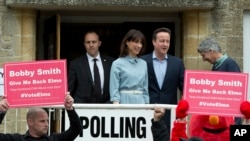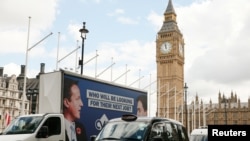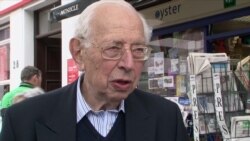A key exit poll shows British Prime Minister David Cameron's Conservatives fared well in Thursday's parliamentary polls, falling just short of an outright majority in the 650-member House of Commons.
The survey — released Thursday by national broadcasters shortly after polls closed — showed the Conservatives winning 316 seats to the opposition Labor Party's 239. The Scottish Nationalist Party was set to win 58.
Analysts say Cameron is likely to remain in office if the combined prediction of 326 seats for Conservatives and their allied Liberal Democrats holds. The two parties have governed in coalition since 2010.
If the projections hold, the outcome would scuttle a pre-election strategy under which Labor and the Scottish National Party would join forces to gain a legislative majority and oust Conservatives from power.
A poll published Wednesday by Britain's Sun newspaper had 58 percent of respondents predicting Cameron will again be prime minister. But a majority of those surveyed, 54 percent, said they are not satisfied with his performance.
If no outright winner emerges, analysts say it may take weeks of negotiations to form a workable coalition government.
Hung parliament likely
“There is most likely to be a hung parliament," Professor Tony Travers of the London School of Economics told VOA affiliate Al Hurra television. "And if that is the case, at the moment, it looks slightly easier for the Labor Party to form a minority government than the Conservatives, simply because there are more parties that would be prepared to work them.”
Observers are calling the polls Britain's most unpredictable and consequential in decades.
If re-elected, Cameron has promised to hold a referendum on whether Britain should stay in the 28-nation European Union. The question of Scottish independence from Britain also remains a key issue. Scottish nationalists lost a plebiscite last year, but could emerge with the third biggest bloc of seats and form a coalition with the Labor Party.
Cameron, Britain's leader since 2010, and Miliband have both cast the election as a referendum on the country's economy, the world's fifth largest.
"People really want to think carefully before casting their vote," Cameron said at a campaign stop at a farm, "but I believe when the crunch comes, when they ask themselves the question: Do I trust Ed Miliband with the economy or do I want to stick with a plan and a team that's turning the country round? I think we can do very well on Thursday and cross that line."
Miliband has attempted to characterize Cameron's Tories as the party of the wealthy.
"This is the clearest choice that has been put before the British people for a generation," Miliband said, "between a Tory government that works only for the privileged few or a Labor government that will put working families first."
Voter concerns
Anxiety about the future was reflected in comments by people at one London polling station on Thursday.
“It is a question of whether this country goes forward or backward," said Michael, a retired stock broker.
WATCH: London voters discuss close election
“I found it actually quite difficult, and normally I do not. I normally know who I vote for," admitted Linda, a charity trustee. "I have always voted for the same party. This year I have found it slightly difficult.”
“It is unfortunate that in this system where the party that is the most popular will not have enough of a majority of seats to win," said Hanid an entrepreneur. "And therefore, this time around it is going to be more important who you vote for.”
Main campaign issues
The campaign has been mainly about the economy. The Conservatives accuse Labor of borrowing and spending too much when it was in power and contributing to the recession of 2008. Labor says Conservative policies during the past five years have cut too many public services.
Professor Simon Hix of the London School of Economics says the two parties present a real choice for voters.
“The big difference in this election is economics, I mean really big difference," Hix noted. "I think we are seeing a choice for the Conservatives of a policy of more cuts in spending and meeting Britain’s deficit reduction within a five-year parliament. And Labor is saying 'No, much slower deficit reduction, committing more money to spend on the [National Health Service] and other areas of public spending.' That is quite a stark economic difference.”
The election is so close that it will likely be well into the wee hours of Friday before the results are known, and possibly several more days before party leaders can negotiate the formation of a new government.
National bird on ballot
Concurrent with the general election is a poll to decide Britain’s national bird. Tens of thousands have voted in the online poll for their favorite from a list of 10, including the barn owl, blackbird, blue tit, hen harrier, kingfisher, mute swan, puffin, red kite, robin and wren.
The winner of the pecking order is expected to be named Friday, around the time results from the parliamentary election appear.
Some material for this report comes from AP, AFP and Reuters.







